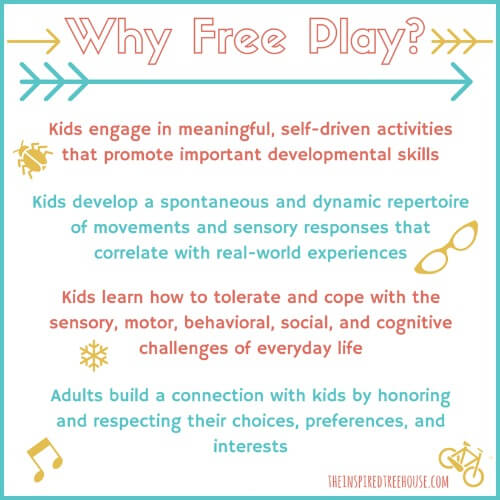This post is part of our Happy New Year, Healthy Kids series, with 20 expert bloggers weighing in about their best tips for raising happy, healthy kids! This series of posts will cover everything from creativity and sleep to social development and nutrition (and much more!).
Unstructured Play – What the Research Says
We’ve been thinking a lot lately about the recent research we’ve been reading regarding the importance of unstructured play for kids. Studies say that free play may correlate with better executive functioning in kids and that unstructured play is essential for physical, social, and emotional well-being. Studies have also found that people who recall having plenty of free time during childhood enjoy high levels of social success as adults.
The verdict is in. Free play rocks! So we’ve been wondering…what does all of this mean for us as therapists (and as bloggers)?
Our job is interesting in that we pretty much always have an “agenda” when we’re playing with kids. We are trained to pick apart their every move (literally) and to zoom in on their behaviors to find out exactly what is going on and why.
Then comes the fun part. We get to turn play into therapy and therapy into play – modifying and tweaking to challenge and meet the needs of the kids we treat. It’s a whole lot of fun, but we almost always have a plan. We know what we’re going to do and why we’re going to do it.
Even though we may have to stick to our “therapist agenda” most of the time at work in order to help kids develop the motor, cognitive, and sensory skills they need most, we also know how important it is that kids have regular exposure to free, unstructured, self-directed play every single day. The kind of play that lets them move, explore, engage, and lead the way!

The Benefits of Unstructured Play
While we firmly believe that there is a place for thoughtful, well-designed activities for kids and scheduled, structured sports and extracurricular activities, we have a feeling that allowing for more child-directed activities in therapy sessions and setting the stage for more self-directed play for our kids at home will:
–Help keep them more engaged for longer periods of time in activities they find meaningful – activities that are also very likely to promote the exact developmental skills we’re trying to focus on as therapists (and as moms!)
–Help them develop a more spontaneous, dynamic, and functional repertoire of movements and sensory responses that correlate better with real-world experiences than structured, planned exercises or activities.
–Help them learn ways to tolerate and cope with the unplanned, unexpected sensory, motor, behavioral, social, and cognitive challenges that arise in everyday life. Check out our Self-Regulation Handbook for more information on this!
–Help us build an even deeper connection and rapport with our students at school and our own kids at home as we honor and respect their choices, preferences, and interests.
How?
So how the heck are we going to walk the line and find a balance between the more structured therapist/mom-directed activities that we know and love and the more open-ended play activities that we know are so beneficial for our kids?
Well, we have some ideas…
Unstructured free play doesn’t necessarily mean checking out and letting the kids run amok. In fact, we think it means the opposite. The kind of unstructured play we’re talking about actually requires a great deal of checking in.
-This means making sure that kids have access to the settings, spaces, basic tools – and above all – the time to engage in self-directed play. Learn more about how the environment shapes the way kids play.
-It means trusting the fact that simple, self-driven play activities are exactly what kids need to develop the motor, sensory, cognitive, and social skills they need.
–If your kids are like ours (not exactly the most independent players) it might mean some playful prompting and loving nudging in the right direction.
–And if you’re control freaks like we are, it means giving the control over to our kids and acknowledging what they’re truly capable of.
-It means having the ability to sit back, be quiet, and watch what happens.
We’ve put together some of our best ideas to ensure that your kids get their daily dose of free play. Here are some great ways to inspire free play in kids – your “Free Play Toolkit”!
Unstructured Play Ideas
-Mix and match different toys that aren’t typically played with together: the train set and the toy dinosaurs, the dollhouse people and the Legos. Check out these ideas for how to encourage independent play!
-Use toys in unusual settings – take art supplies on your nature walk or inside a fort, build with blocks in the sand box, get crazy with Legos in the water table!
What would you add to the list? Think back to your childhood– where did your most memorable play take place? Who were you with? What “materials” did you use?

Latest posts by Claire Heffron (see all)
- Cute Zipper Bags for Therapists - April 18, 2024
- Fairy Tale Games and Toys - April 12, 2024
- The Best Emotional Regulation Books for Kids - April 8, 2024


[…] Free Play Every Day! The Free Play Toolkit || The Inspired Treehouse How to Be a Tour Guide for Language Development || The Inspired Treehouse guest contributor: Becky Bowen The Best Ways to Support Kids in Social Situations || Encourage Play 7 Ways To Encourage Gross Motor Development || Pink Oatmeal EXPLORE MORE – WORRY LESS: Children depend on it || Timbernook How to Rotate Toys in 5 Simple Steps || OT Cafe Weekly Creativity Prompts || Tiny Rotten Peanuts Everyday Learning in Everyday Life || Your Kids OT Mindfulness and a Morning Ritual || Kids Yoga Stories Building Up Your Kids Immune System Through Nutrition || Your Kids Table Why is Sensory Play so Important for Development? || Golden Reflections Blog A Moving School Experience: Classroom Ideas for Kids With Sensory Needs || The Inspired Treehouse guest contributors: Dr. Jane Humphries and Kari Rains The Power of Food and How to Expand Your Kids’ Palate || Prescribe Nutrition Using Sensory Play to Connect With Your Child || Mama OT Executive Functioning and Cognitive Skills || Tools to Grow Tips for Maximizing Your Next Visit to the Pediatrician || Seattle Mama Doc Visual Motor Integration || Sugar Aunts Calming Strategies for Kids || Yogapeutics Inspiration for Following Your Child’s Lead || Meri Cherry […]